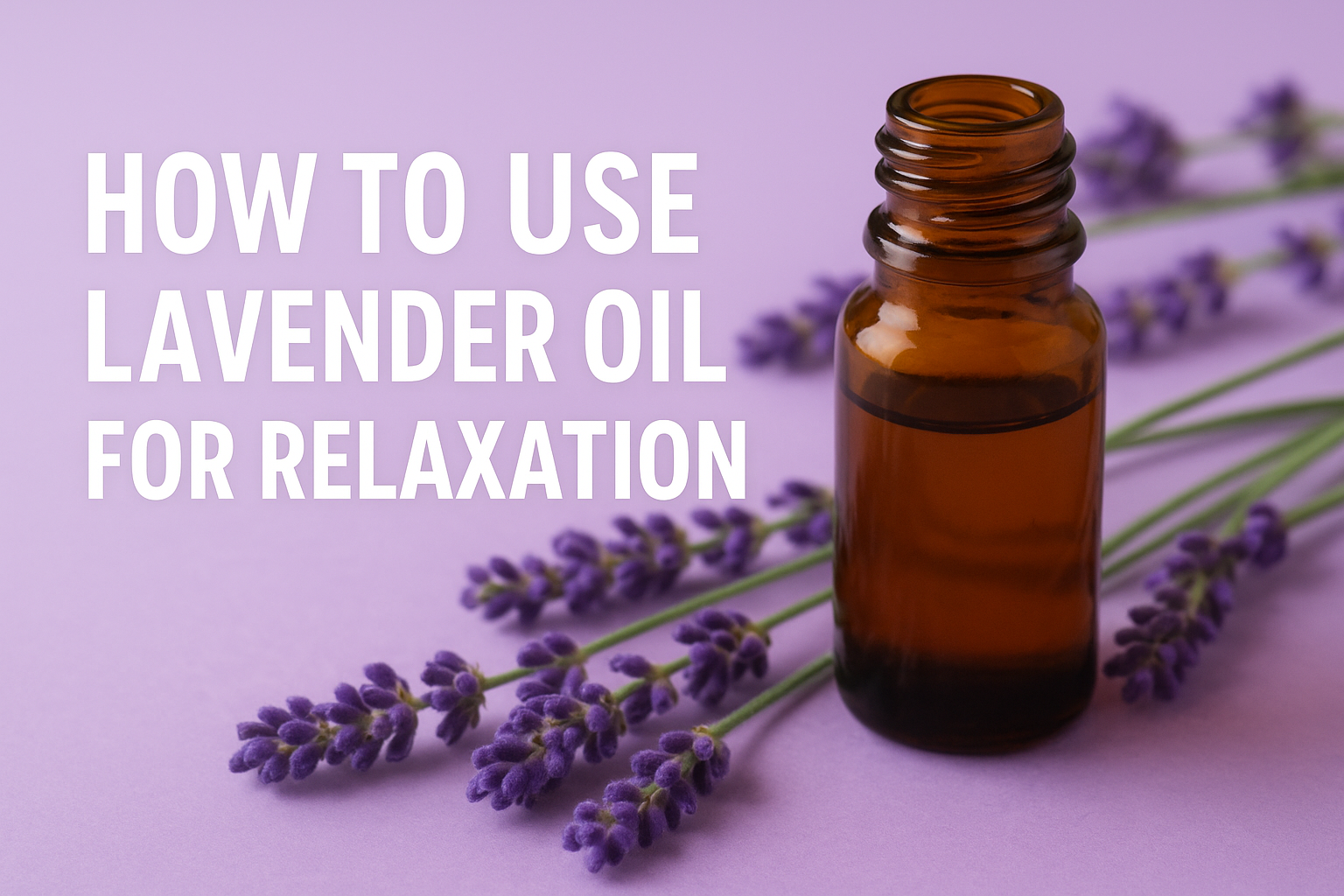Introduction: A Fragrant Path to Calm and Balance
In today’s fast-paced world, where screens, schedules, and stress dominate daily life, finding true relaxation can feel impossible. Yet, nature offers us an aromatic solution in the form of lavender essential oil — one of the most beloved and scientifically proven remedies for stress, anxiety, and insomnia.
Used for centuries in aromatherapy and Ayurveda, lavender oil is known for its soothing scent and healing power. Whether diffused in the air, added to a bath, or applied on the skin, this oil calms the nervous system, relaxes muscles, and helps you drift into deeper sleep.
This guide explores how to use lavender oil for relaxation, the science behind its calming effects, and easy ways to include it in your daily wellness routine.
What Makes Lavender Oil Effective for Relaxation?
Lavender oil (Lavandula angustifolia) is extracted from the flower spikes of the lavender plant through steam distillation. It contains active compounds like linalool and linalyl acetate, both known for their sedative and anxiety-reducing properties.
A 2023 review in the Journal of Herbal Medicine found that inhalation or topical use of lavender essential oil significantly reduced cortisol (the stress hormone) and improved sleep quality.
How Lavender Oil Calms the Nervous System
When inhaled, lavender’s scent molecules travel through the olfactory system to the brain’s limbic region — the emotional control center. This interaction reduces sympathetic nervous activity, lowers heart rate, and encourages parasympathetic (rest-and-digest) dominance, helping the body relax naturally.
Ayurvedic Perspective on Lavender Oil
In Ayurveda, lavender oil is associated with balancing Vata and Pitta doshas. Its cooling, calming, and aromatic properties make it ideal for those who experience anxiety, irritability, or restlessness. Lavender also nourishes prana (vital energy), promoting emotional clarity and peaceful sleep.
Step-by-Step Guide: How to Use Lavender Oil for Relaxation
Learning how to use lavender oil correctly can enhance its effects and make it a powerful part of your daily self-care ritual.
1. Diffusion for Instant Calm
Add 4–6 drops of lavender oil to an essential oil diffuser or humidifier. Let the aroma fill your room for 15–30 minutes.
Best for: Evening relaxation, work stress, or before meditation sessions.
Tip: Blend with chamomile or frankincense oil for deeper tranquility.
2. Relaxing Lavender Bath Soak
Combine 8–10 drops of lavender oil with 1 cup of Epsom salt and mix it into warm bathwater. Soak for at least 20 minutes to ease body tension and calm the mind.
Best for: Muscle fatigue, anxiety, or insomnia relief.
3. Topical Massage Blend
Mix 3 drops of lavender oil with 1 tablespoon of carrier oil (like coconut, almond, or jojoba oil). Gently massage onto your temples, wrists, or neck.
Best for: Bedtime relaxation and immediate stress relief.
4. Pillow Mist for Deep Sleep
Create a DIY pillow spray by mixing 10 drops of lavender oil with 2 tablespoons of witch hazel and ½ cup of distilled water. Shake well and spray lightly on your pillow before bed.
Best for: Improving sleep quality and calming the senses.
5. Steam Inhalation for Mental Refreshment
Add 3 drops of lavender oil to a bowl of hot water. Cover your head with a towel and inhale deeply for 5 minutes.
Best for: Clearing mind fatigue and soothing headaches.
Benefits of Lavender Oil Beyond Relaxation
Lavender oil isn’t just about calming the mind — it’s a multifunctional elixir for both body and soul.
Physical Health Benefits
- Relieves headaches and migraines naturally
- Reduces muscle soreness and inflammation
- Promotes wound healing due to antibacterial properties
- Improves respiratory comfort during seasonal allergies
Emotional & Mental Wellness Benefits
- Reduces anxiety, panic attacks, and emotional stress
- Enhances mood and supports emotional balance
- Aids in meditation and mindfulness practices
- Supports deeper, more restorative sleep
Precautions and Safety Tips
Lavender oil is gentle, but it’s still a potent essential oil that requires safe handling.
When Using Topically
Always dilute with a carrier oil to prevent irritation. A safe ratio is 3 drops of lavender oil per tablespoon of carrier oil. Perform a patch test before use.
When Using Aromatically
Avoid prolonged diffusion in enclosed spaces, especially around pets or infants. 20–30 minutes at a time is sufficient.
Avoid Internal Consumption
Unless prescribed by a qualified professional, do not ingest essential oils.
Conclusion: Embrace Calmness with Every Breath
Lavender oil is more than a pleasant scent — it’s a natural remedy for peace, clarity, and rejuvenation. Whether used in diffusers, baths, massages, or sleep rituals, this oil nurtures the body and mind in gentle harmony.
By integrating lavender aromatherapy into your lifestyle, you can reduce stress, sleep better, and restore emotional balance naturally — one drop at a time.
So tonight, dim the lights, take a deep breath, and let lavender’s essence wrap you in calm serenity.
FAQs Section
1. Can lavender oil really help with anxiety?
Yes, multiple studies show lavender oil reduces anxiety and stress levels by calming the nervous system naturally. It works both aromatically and topically.
2. How often should I use lavender oil for relaxation?
You can use it daily — diffuse for 30 minutes, or apply topically once or twice a day, depending on your comfort level.
3. Can lavender oil help with sleep problems?
Absolutely. Applying diluted lavender oil to your temples or diffusing it before bed improves sleep quality and duration.
4. Can I mix lavender oil with other oils?
Yes, it blends beautifully with chamomile, bergamot, sandalwood, and ylang-ylang for enhanced calming effects.
5. Is lavender oil safe for children?
Yes, in diluted form. Use 1 drop per tablespoon of carrier oil and avoid direct contact with eyes or mouth.

